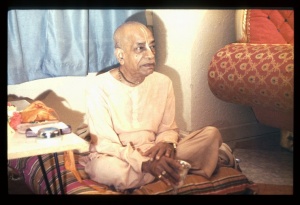CC Madhya 23.77: Difference between revisions
m (1 revision(s)) |
(No difference)
|
Revision as of 16:02, 20 March 2008

A.C. Bhaktivedanta Swami Prabhupada
TEXT 77
jīveṣv ete vasanto ‘pi
bindu-bindutayā kvacit
paripūrṇatayā bhānti
tatraiva puruṣottame
SYNONYMS
jīveṣu—in the living entities; ete—these; vasantaḥ—are residing; api—though; bindu-bindutayā—with a very minute quantity; kvacit—sometimes; paripūrṇatayā—with fullness; bhānti—are manifested; tatra—in Him; eva—certainly; puruṣa-uttame—in the Supreme Personality of Godhead.
TRANSLATION
“‘These qualities are sometimes very minutely exhibited in living beings, but they are fully manifested in the Supreme Personality of Godhead.’
PURPORT
This verse is found in the Bhakti-rasāmṛta-sindhu (2.1.30). Living entities are parts and parcels of the Supreme Personality of Godhead. As Lord Kṛṣṇa states in the Bhagavad-gītā (BG 15.7):
- mamaivāṁśo jīva-loke jīva-bhūtaḥ sanātanaḥ
- manaḥ-ṣaṣṭhānīndriyāṇi prakṛti-sthāni karṣati
“The living entities in this conditioned world are My eternal, fragmental parts. Due to conditioned life, they are struggling very hard with the six senses, which include the mind.” The qualities of Kṛṣṇa are present in the living entity in minute, atomic quantities. A small portion of gold is certainly gold, but it cannot be equal to a gold mine. Similarly, the living entities have all the characteristics of the Supreme Personality of Godhead in minute quantity, but the living entity is never equal to the Supreme Personality of Godhead. God is therefore described as the Supreme Being, and the living entity is described as a jīva. God is described as the Supreme Being, the chief of all living beings, because He is supplying the necessities of all others—eko bahūnāṁ yo vidadhāti kāmān. The Māyāvādīs maintain that everyone is God, but even if this philosophy is accepted, no one can maintain that everyone is equal to the Supreme Godhead in every respect. Only unintelligent men maintain that everyone is equal to God or that everyone is God.